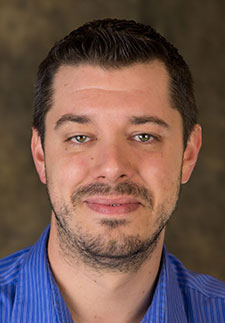A biology professor at Pennsylvania College of Technology who specializes in brain research was an appropriate participant for the topic “Shaping Your Brain for the Future” – the theme of the second annual STEM Awareness Career Day held recently at Wellsboro Area High School’s administration building.
Justin M. Ingram, assistant professor of biology (anatomy and physiology), spoke with approximately 500 eighth-graders from all three Tioga County school districts – Northern Tioga, Southern Tioga and Wellsboro – and showed the students objects including human brains.
 “I used human brains as an example and explained that, although all of our brains are similar in size, it's the experiences we acquire through life that make us all unique,” Ingram said. “So, my ending advice was: ‘Get as many experiences as you can to shape your brain into that career choice that you want.’ That's exactly what we give students here at Penn College.”
“I used human brains as an example and explained that, although all of our brains are similar in size, it's the experiences we acquire through life that make us all unique,” Ingram said. “So, my ending advice was: ‘Get as many experiences as you can to shape your brain into that career choice that you want.’ That's exactly what we give students here at Penn College.”
This was Ingram’s second year participating in the STEM Awareness Career Day. (STEM is an acronym for science, technology, engineering and math.) The event is conducted by the Tioga County Development Corp. in conjunction with Shell Appalachia, Penn College at Wellsboro, Mansfield University, the Northern Tier Regional Planning and Development Commission, Northern Tier Industry and Education Consortium, and Tioga County Partnership for Community Health.
Ingram holds a doctorate in neuroscience from Penn State. He earned a Bachelor of Science in biology/chemistry and an Associate of Applied Science in nanotechnology from Lock Haven University. He joined Penn College’s faculty in 2013.
Aside from teaching, Ingram specializes in understanding the chemical composition of the brain to predict future brain activity.
“Using oxygen nanosensors, I’ve successfully been able to monitor real-time oxygen dynamics in epileptic brain tissue and use these dynamics to predict when a seizure will occur,” Ingram said. “If one can predict the future, they could then intervene before an epileptic event occurs.”
Biology courses are offered through Penn College’s School of Sciences, Humanities & Visual Communications.
To learn more about the college, a national leader in applied technology education and workforce development, email the Admissions Office or call toll-free 800-367-9222.
Justin M. Ingram, assistant professor of biology (anatomy and physiology), spoke with approximately 500 eighth-graders from all three Tioga County school districts – Northern Tioga, Southern Tioga and Wellsboro – and showed the students objects including human brains.
 “I used human brains as an example and explained that, although all of our brains are similar in size, it's the experiences we acquire through life that make us all unique,” Ingram said. “So, my ending advice was: ‘Get as many experiences as you can to shape your brain into that career choice that you want.’ That's exactly what we give students here at Penn College.”
“I used human brains as an example and explained that, although all of our brains are similar in size, it's the experiences we acquire through life that make us all unique,” Ingram said. “So, my ending advice was: ‘Get as many experiences as you can to shape your brain into that career choice that you want.’ That's exactly what we give students here at Penn College.”This was Ingram’s second year participating in the STEM Awareness Career Day. (STEM is an acronym for science, technology, engineering and math.) The event is conducted by the Tioga County Development Corp. in conjunction with Shell Appalachia, Penn College at Wellsboro, Mansfield University, the Northern Tier Regional Planning and Development Commission, Northern Tier Industry and Education Consortium, and Tioga County Partnership for Community Health.
Ingram holds a doctorate in neuroscience from Penn State. He earned a Bachelor of Science in biology/chemistry and an Associate of Applied Science in nanotechnology from Lock Haven University. He joined Penn College’s faculty in 2013.
Aside from teaching, Ingram specializes in understanding the chemical composition of the brain to predict future brain activity.
“Using oxygen nanosensors, I’ve successfully been able to monitor real-time oxygen dynamics in epileptic brain tissue and use these dynamics to predict when a seizure will occur,” Ingram said. “If one can predict the future, they could then intervene before an epileptic event occurs.”
Biology courses are offered through Penn College’s School of Sciences, Humanities & Visual Communications.
To learn more about the college, a national leader in applied technology education and workforce development, email the Admissions Office or call toll-free 800-367-9222.
